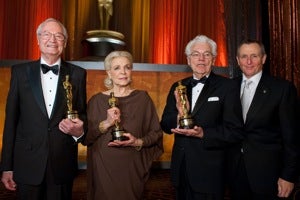Before Tuesday has ended, three or four people will win Academy Awards.
The process will involve some quiet head-to-head competition behind closed doors, but only a genteel level of campaigning. The winners won't know the names of the people they beat, and the losers won't know they were even in the running.
But the special meeting of the Academy's Board of Governors will choose the recipients of the 2010 Governors Awards, and result in three or four industry veterans taking home shiny new Oscar statuettes (and perhaps an Irving Thalberg and/or Jean Hersholt award as well) at a ceremony on Nov. 13.
 Predictions are risky, but honorees could range from Doris Day to Brian Grazer, Tony Curtis to Robert Evans.
Predictions are risky, but honorees could range from Doris Day to Brian Grazer, Tony Curtis to Robert Evans.
Under new rules that were passed last year when the Governors Awards were moved off the Oscar telecast to their own non-televised show, the first three honorary awards require only a majority vote of the 43 governors; the fourth requires a three-fourths vote.
The new rules make it a virtual certainty that three people will be chosen as Oscar recipients, and a likelihood that the slate will be made up of four, as it was last year at the first Governors Awards ceremony.
The awards come in three categories: the Irving Thalberg Award, which is given to a producer for his body of work; the Jean Hersholt Humanitarian Award, awarded for charitable or humanitarian efforts; and the most-awarded of the three, the Honorary Academy Award, which honors a career in any aspect of film.
Last year’s Governors Awards – a collegial affair in which informal toasts were given and there was no time limit on speeches – was extremely well-received within the Academy, making it likely that the governors will adopt a similar approach this year.
2009 Governors Awards went to actress Lauren Bacall, executive John Calley (who was given the Thalberg), producer Roger Corman and cinematographer Gordon Willis. (In the AMPAS photo above, they are shown with Academy president Tom Sherak.) A similar spread would result in one award to a veteran actor who’d been overlooked in the past, one to below-the-line talent, probably a Thalberg as well.
So who’s in the running? The answer relies on guesswork – governors are free to nominate anyone still alive and not on the board, and runners-up are never announced.
But among actors who have yet to be rewarded, Doris Day is perhaps the most frequently mentioned, and the subject of the most concerted campaigning outside the Academy. Drawbacks: AMPAS tends to ignore outside campaigning, and the reclusive Day is probably a longshot to attend.
Other actors who’ve been mentioned include Tony Curtis, Albert Finney, Christopher Plummer, Jeanne Moreau, Debbie Reynolds, Maureen O’Hara and Max Von Sydow; none are slam dunks, but a passionate governor could make a persuasive case for any of them.
In the crowded competition for a Thalberg award, Alan Ladd Jr. and Brian Grazer have been mentioned as possible recipients in the past, though James Ivory, Scott Rudin, Robert Evans and even James Cameron could be in the running.
(Given Pixar’s track record, John Lasseter seems to be a no-brainer pick for this particular award when he leaves the board.)
With Willis’ selection last year, another cinematographer is unlikely; look, instead, maybe an editor (though Dede Allen’s death in April robbed the Academy of an easy pick) or a documentarian (Albert Maysles?) or, given current trends in cinema, a special effects pioneer like Douglas Trumbull.
The board could look outside the United States to an influential European director – though it’s hard to imagine, say, Jean-Luc Godard not making a point of rejecting the honor. (Would Alain Resnais be more accommodating?)
They could look at the Academy Awards show itself, and decide that since Gil Cates doesn’t appear to be on the producers’ shortlist anymore, they should reward him as the man who righted the ceremony in the aftermath of the Allan Carr disaster, and produced more Oscar shows than anyone else.
Or they could turn to the Jean Hersholt Humanitarian Award, and consider the likes of Mia Farrow.
It’ll all happen in a few rounds of voting at Tuesday evening’s board meeting. The meeting begins, according to those who’ve participated, with each governor given a chance to nominate candidates.
Usually, around 10 people are nominated, and the names placed on a board without regard to whether they’ve been put up for the Hersholt, Thalberg or Honorary Oscar.
Each governor then votes electronically for the person they think is most deserving. But the person with the most votes isn’t an automatic Oscar winner – he or she simply moves on to a second round of voting, in which a single question is put before the governors: Do you support giving an Oscar to this candidate? If 22 of the 43 governors (assuming a full house) vote yes, an Oscar is awarded.
The process then begins again: an initial vote narrows the remaining candidates to one, and a second vote decides the fate of that one.
So it goes, until the candidates don’t get enough votes, or until the limit is reached. (From 2002 through 2008, that limit was two honoraries in a single year; now, it’s four.)
And once the limit is reached and the meeting comes to an end, the winners will be revealed.
The Governors Awards ceremony will take place at the Grand Ballroom at the Hollywood & Highland Center. The show will be produced by former Academy president Sid Ganis, and by Don Mischer Productions.





